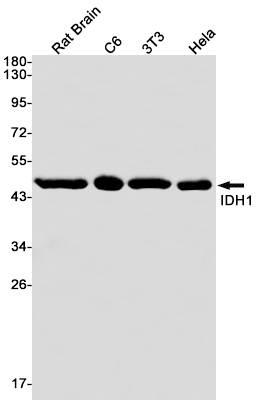Isocitrate dehydrogenase Recombinant Rabbit mAb
Cat No.: ARM1039
 Size:
Size:

| Product Name: | Isocitrate dehydrogenase Recombinant Rabbit mAb |
| Cat No.: | ARM1039 |
| source: | Rabbit |
| reactivity: | Human, Mouse, Rat |
| applications: | WB,IHC,IP |
| clonality: | Monoclonal |
| recommended dilution: | WB,IHC,IP |
| format: | Liquid |
| isotype: | IgG |
| immunogen: | A synthetic peptide of human Isocitrate dehydrogenase |
| calculated molecular weight: | 47 kDa |
| observed molecular weight: | 47 kDa |
| genbank accession number: | O75874 |
| gene id (ncbi): | 3417 |
| purification method: | Affinity Purification |
| conjugate: | Un-conjugated |
| storage: | Store at -20°C. Supplied in 50nM Tris-Glycine(pH 7.4), 0.15M NaCl, 40%Glycerol, 0.01% sodium azide and 0.05% BSA. Stable for 12 months from date of receipt. |
| synonyms: | IDH; IDP; IDCD; IDPC; PICD; HEL-216; HEL-S-26 |
| category: | Primary Ab |
| concentration: | 1mg/ml |
| background: | Isocitrate dehydrogenases catalyze the oxidative decarboxylation of isocitrate to 2-oxoglutarate. These enzymes belong to two distinct subclasses, one of which utilizes NAD(+) as the electron acceptor and the other NADP(+). Five isocitrate dehydrogenases have been reported: three NAD(+)-dependent isocitrate dehydrogenases, which localize to the mitochondrial matrix, and two NADP(+)-dependent isocitrate dehydrogenases, one of which is mitochondrial and the other predominantly cytosolic. Each NADP(+)-dependent isozyme is a homodimer. The protein encoded by this gene is the NADP(+)-dependent isocitrate dehydrogenase found in the cytoplasm and peroxisomes. It contains the PTS-1 peroxisomal targeting signal sequence. The presence of this enzyme in peroxisomes suggests roles in the regeneration of NADPH for intraperoxisomal reductions, such as the conversion of 2, 4-dienoyl-CoAs to 3-enoyl-CoAs, as well as in peroxisomal reactions that consume 2-oxoglutarate, namely the alpha-hydroxylation of phytanic acid. The cytoplasmic enzyme serves a significant role in cytoplasmic NADPH production. Alternatively spliced transcript variants encoding the same protein have been found for this gene. [provided by RefSeq, Sep 2013] |

